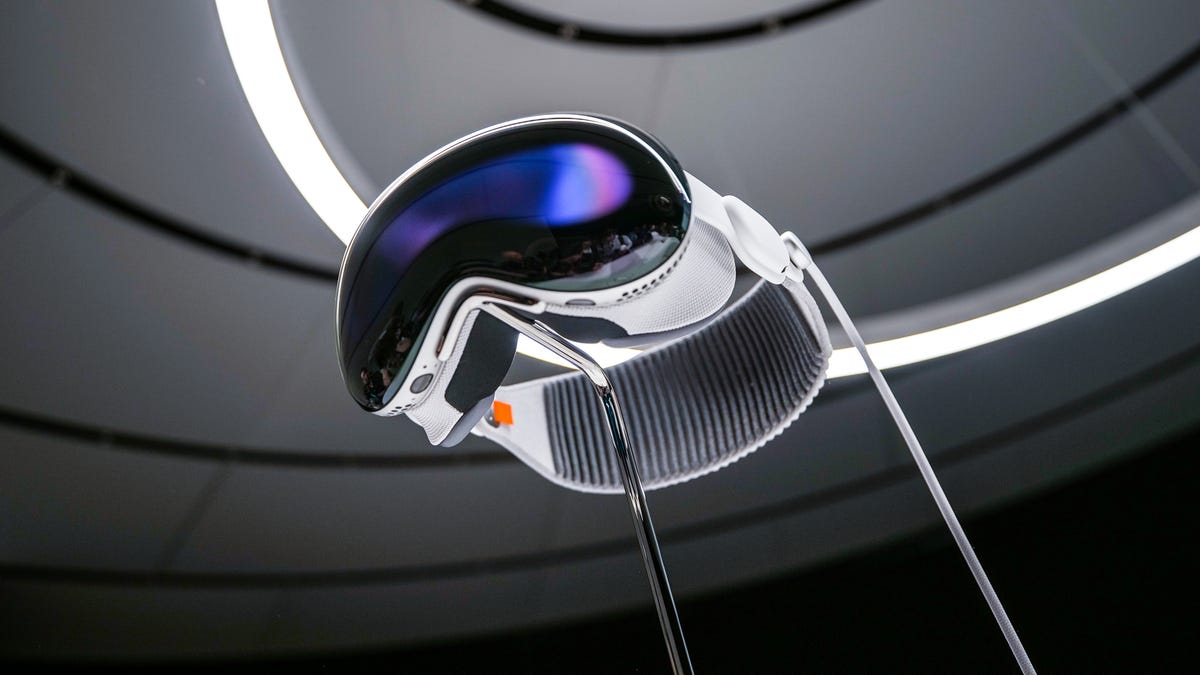Apple Stole CES Without Being There -- Again
The Vision Pro headset's Feb. 2 launch date swooped in over Las Vegas, overshadowing VR/AR news at the massive trade show, conjuring memories of the iPad and iPhone launches.

I remember CES 2010, sort of. There was an innovative tablet/netbook hybrid by Lenovo I saw there, called the IdeaPad U1 Hybrid. I remember it, but you probably don't. That's partly because, weeks later, Apple announced the iPad, after expectations of it had loomed over CES like a cloud. The tablet landscape shifted quite a bit after that. It looks like it's happening again.
A day ahead of the official kickoff of CES 2024, which is expected to have lots of AR and VR news as always, Apple announced the launch date for the Vision Pro. Details were dropped about the headset that clearly were designed to overshadow anything announced in Las Vegas, including possible details on Samsung's upcoming mixed-reality headset made in cooperation with Google and Qualcomm.
A tactical move, surely. But it's also a sign of how unsettled the AR/VR landscape still is, a decade after my first demo of the Oculus Rift at CES in 2013.
Phones are familiar commodity devices now, but in 2007, Apple pulled a similar stunt by announcing the iPhone at MacWorld while CES was happening elsewhere. It laid the groundwork for a redefinition of what phones felt like, and what they did.
The iPad's announcement in 2010, while initially feeling derivative of the iPhone, ended up doing the same for tablets -- and in January, shortly after CES, too.
Apple doesn't seem to have any event planned at all for the upcoming Vision Pro. Instead, after announcing the headset last year at Apple's WWDC developer conference and having a few demos there and later in the fall, it looks like the advanced piece of hardware will be available for preorder on Jan. 19 with no other in-person event to accompany it.
Meta's Quest headsets have been VR's best products for years. Apple's poised to push the conversation on software and design, although at a far higher price.
VR already exists, and some of the hardware has even been somewhat successful. The Meta Quest 2 and Quest 3 have found their way into a ton of family homes I know of, and became a popular game console for kids despite them not being intended for younger children. It's also a pretty great fitness device, although it can get sweaty in those goggles. Sony's PlayStation VR, and plenty of PC-connected Steam headsets, have been kicking around for VR games for years, too.
But a lot of the landscape has hit challenges. Microsoft pretty much ended its own mixed-reality hardware and software efforts that it started with the HoloLens and Windows-connected VR headsets, shuttering the metaverse platform AltSpaceVR, too.
Meta's largely moved away from PC-based VR to leaning on apps running on self-contained Quest headsets, but future plans for AR glasses may push Meta towards even bigger hardware and software changes in the next few years.
Apple's arrival could be dovetailing with other industry changes: mixed-reality capabilities that blend VR and the real world more seamlessly, for instance, which has already started on Meta's Quest 3 released in the fall. Apple's headset, running iOS, also opens up possibilities for better cross-device and app support for headsets. Samsung and Google are likely to follow suit with their own headset later this year, which will probably run Android and Google Play apps.
Apple is also refining hand- and eye-tracking technology in ways that look to be stepping ahead of where companies like Meta are already leaning. Meta's headsets are likely to become truly controller-optional soon, and a future of more advanced smartwatches with gesture interfaces could work with advanced AR glasses in years to come, leaning on similar gestural interfaces. The Vision Pro's work here could be a head start.
It's hard enough to convince people to buy a $500 VR headset; Apple's $3,499 one is something most people won't even consider getting. But its presence -- and its possibilities -- already seem futuristic. In a sense, it's already a kind of living CES demo in product form. What better way to launch such a device than right after a show dedicated to experimental products aspiring to be real, too?
Right now, in the AR and VR space, it's going to be hard for anyone else to compete on the terms Apple is laying out. Few current headsets have the high-end display the Vision Pro boasts. And none have such a deep software integration for everyday mobile apps. More headsets are going to get better micro-OLED displays, and Google's potential opening up of Android and Google Play to mixed reality should open pathways for more headsets to feel like they can work with the types of apps we already use on our phones.
This has been Meta's biggest hurdle: Quest OS and its app store are separate from the computers, phones and tablets we already use. Even though Meta's been folding in Microsoft Office apps and a variety of 2D apps, it's not the same thing as popping a headset on that's already running all the software and hook-ins you're already using on your other devices.
In that sense, the Vision Pro may be signaling a more functional change in headsets. Or will it be an experiment that doesn't succeed? Either way, we're talking about it during CES… again. What a familiar feeling.

